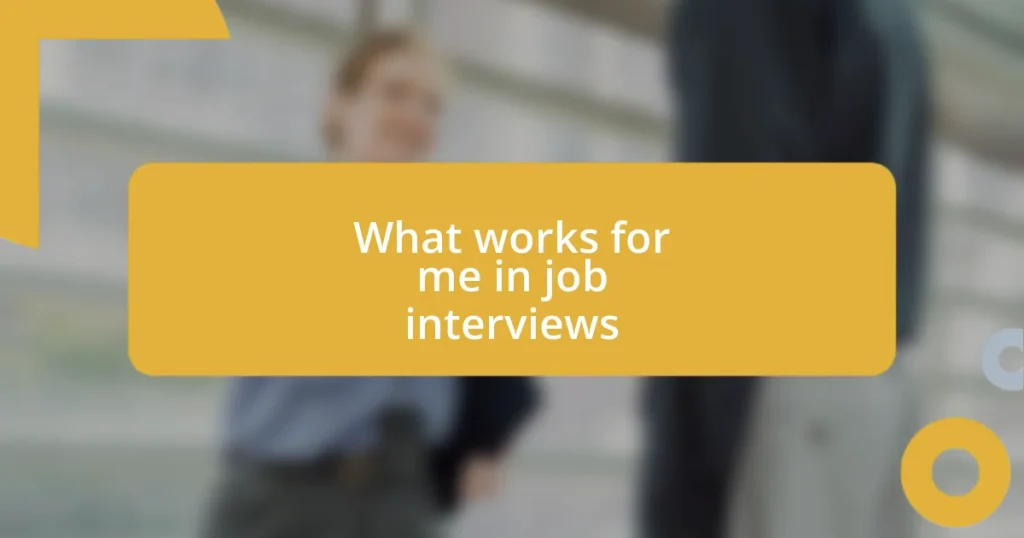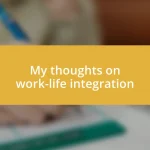Key takeaways:
- Understanding various job interview formats, such as panel and behavioral interviews, can enhance your preparation and performance.
- Researching the company and its values beforehand allows candidates to tailor their answers and create meaningful connections during interviews.
- Following up with a thank-you note not only expresses appreciation but also reinforces your value and fit for the role.

Understanding job interview formats
Job interviews come in various formats, each serving different purposes and revealing unique aspects of a candidate. I remember my first phone interview; I was so nervous that I could barely remember my own achievements. It made me realize that understanding the format you’re facing can significantly affect your performance.
Have you ever thought about how the setting of an interview can influence your nerves? For instance, a panel interview, where a group of interviewers fires questions at you, can feel intimidating. However, I found that this format allowed me to showcase my ability to think on my feet and engage with multiple perspectives.
Then there’s the behavioral interview, where questions revolve around your past experiences. This format really taps into your emotional intelligence. I once faced a question about resolving conflict in a team, which pushed me to reflect on my struggles and triumphs, ultimately making my answer more authentic and compelling. Understanding these formats lets you tailor your preparation effectively and brings out your true self in the conversation.

Preparing for common interview questions
Preparing for common interview questions can be a game-changer. I once spent hours drafting responses to typical questions like “What are your strengths and weaknesses?” but realized that rehearsing without context didn’t work for me. Authenticity matters more than a perfectly polished answer. Instead, I began using the STAR method—Situation, Task, Action, Result—to structure my responses. This approach helped me weave in real stories that demonstrated my skills and experiences, making my answers memorable.
Here’s a list of common questions to consider while preparing:
- Tell me about yourself.
- What are your greatest strengths?
- Describe a challenging situation at work and how you handled it.
- Where do you see yourself in five years?
- Why do you want to work here?
Whenever I faced these questions, I would visualize an actual interview scenario. It transformed dry rehearsals into engaging dialogues, which made me feel more comfortable and confident. This shift in preparation style truly made a difference in my performance.

Researching the company in advance
Researching the company in advance is a crucial step that I always emphasize. When I walk into an interview, I want to know as much as possible about the organization’s culture and values. On one occasion, I discovered through research that the company valued innovation and creative problem-solving. This insight allowed me to highlight a project where I drove a creative solution, aligning my experiences with their ethos. It’s amazing how having that context can help you connect your own story with the company’s mission.
Moreover, I often make it a point to follow the company’s recent news. I remember a time when I learned about a significant product launch just before an interview. By referencing that event, I not only impressed my interviewers but also showed genuine enthusiasm for their work. It felt rewarding to share insights that demonstrated my interest, and it sparked a more engaging conversation. This kind of preparation can really set candidates apart.
Finally, understanding the industry trends related to the company can showcase your expertise. I try to identify challenges and opportunities that may impact the organization. In one interview, I discussed how a particular trend might influence their market position, and it led to a dynamic discussion that showcased my understanding. This preparation transforms you from just another candidate into a knowledgeable participant in the conversation, which I believe truly resonates with employers.
| Benefits of Researching | Pitfalls of Not Researching |
|---|---|
| Enhanced confidence to answer questions | Feeling unprepared and disconnected |
| Ability to showcase relevant experiences | Missing opportunities to impress |
| Creating engaging dialogues based on knowledge | Limited conversation flow |

Practicing body language techniques
Practicing body language techniques is something I take seriously before an interview. I remember a time when I recorded myself answering questions and noticed how often I crossed my arms. It struck me that this gesture could be interpreted as defensive. So, I started focusing on open postures, like keeping my hands visible and uncrossed, which made me feel more approachable and relaxed. Have you ever noticed how your posture affects your mindset?
Another effective technique for me has been the power of eye contact. I found that maintaining appropriate eye contact not only conveys confidence but also helps build a connection with the interviewer. There was one moment when I engaged with my interviewer by nodding and maintaining eye contact during their responses. This mutual exchange created a sense of rapport and trust, making the conversation feel more like a dialogue than a Q&A session.
Lastly, I often practice mirroring subtle body language. This technique involves subtly mimicking the interviewer’s gestures and mannerisms, creating a sense of alignment. I remember an instance when my interviewer leaned slightly forward while sharing a story, and I unconsciously did the same. It felt like we were sharing an unspoken connection, which undoubtedly made the interaction more enjoyable for both of us. Have you ever tried mirroring? The impact can be surprisingly powerful.

Highlighting relevant experiences effectively
When highlighting relevant experiences, I find it essential to tailor my stories to the specific role I’m applying for. One time, in a marketing interview, I described a campaign I led that was directly aligned with their goals. By focusing on the metrics I achieved, I could illustrate my impact in a way that resonated with their needs. Isn’t it fascinating how a well-chosen example can transform your narrative into a compelling case for why you’re the perfect fit?
I also believe in using the STAR method—Situation, Task, Action, Result—as a structured way to convey experiences. For instance, during an interview for a project management position, I recounted a situation where I was tasked with turning around a failing project. By clearly outlining each element of the STAR approach, I made it easy for the interviewers to see my role and the end results. It’s almost like painting a vivid picture of my contributions so they can envision me as part of their team.
Moreover, I always try to balance relevant technical skills with soft skills during discussions. One memorable interview involved a question about teamwork. I shared a story about collaborating across departments to solve a complex issue. In doing so, I not only highlighted my problem-solving abilities but also showcased my ability to build relationships. It’s crucial to remember that employers are looking for candidates who can not only do the job but also fit into their team dynamic. What better way to illustrate that than by sharing an experience that captures both?

Following up after the interview
Following up after an interview is an essential yet often overlooked step in the job search process. I remember sending a thank-you email after an interview that went exceptionally well. In that email, I expressed my appreciation for the opportunity and highlighted a specific moment from our conversation that resonated with me. It felt good to reinforce my genuine interest in the role. Have you ever considered how a simple thank-you note can set you apart from other candidates?
One strategy I’ve found effective is timing my follow-up. A couple of days after my interview, I reached out to check on the hiring process. It’s important to strike a balance—too soon can seem impatient, while too late may appear indifferent. For me, waiting about two days helped me maintain enthusiasm without pressuring the interviewer. Do you think a timely follow-up can leave a lasting impression?
Finally, I want to emphasize the power of reiterating your value. In one case, after an interview for a position I was very passionate about, I included a brief paragraph in my follow-up email that summarized how my skills aligned with the company’s goals. It reminded the interviewer of our conversation and clarified what I could bring to the table. Have you considered using your follow-up as a chance to reinforce your fit for the role?

Learning from interview feedback
Learning from interview feedback can be a game-changer for future opportunities. After one particular interview where I felt I had connected well, I received feedback that, while favorable, highlighted how my answers could have been more concise. At first, I was a bit taken aback, but then I realized that clarity and brevity are just as important as content. Have you ever felt how crucial it is to adjust your approach based on feedback you’ve received?
In another instance, after a challenging interview, I took the time to ask the recruiters for specific feedback on my performance. They pointed out that my responses were strong, but I tended to elaborate too much on certain points. Reacting to that advice, I practiced refining my answers with a friend. As I began to embrace this change, I could feel my confidence grow. Isn’t it incredible how a small tweak can lead to significant improvements?
Ultimately, I always make a point to apply the lessons learned from each experience. After adapting my interview style based on feedback, I was thrilled to land a dream job a few months later. I found that by being open to constructive criticism and integrating those insights, I not only improved my interviews but also built resilience. Have you taken the time to reflect on the feedback you’ve received? It may just become a stepping stone to your next opportunity!















